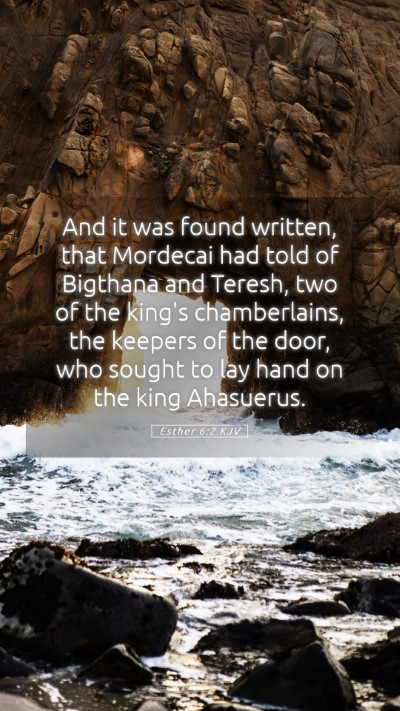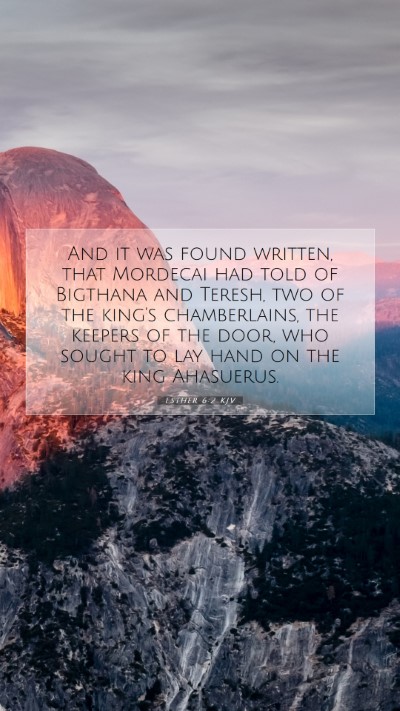Old Testament
Genesis Exodus Leviticus Numbers Deuteronomy Joshua Judges Ruth 1 Samuel 2 Samuel 1 Kings 2 Kings 1 Chronicles 2 Chronicles Ezra Nehemiah Esther Job Psalms Proverbs Ecclesiastes Song of Solomon Isaiah Jeremiah Lamentations Ezekiel Daniel Hosea Joel Amos Obadiah Jonah Micah Nahum Habakkuk Zephaniah Haggai Zechariah MalachiEsther 6:2 Meaning
What is the meaning of Esther 6:2?
And it was found written, that Mordecai had told of Bigthana and Teresh, two of the king's chamberlains, the keepers of the door, who sought to lay hand on the king Ahasuerus.
Esther 6:2 Bible Verse Meaning
Understanding Esther 6:2
Esther 6:2 presents a pivotal moment in the Book of Esther that reveals God’s providence and the turning of events that lead to the deliverance of the Jewish people. In this verse, we read:
"And it was found written that Mordecai had told of Bigthan and Teresh, two of the king's eunuchs, the keepers of the door, who sought to lay hands on the king Ahasuerus."
Historical Context
To fully grasp the meaning of this passage, we must consider the historical context in which it was written. During the reign of King Ahasuerus (often identified with Xerxes I), the Jewish people were living in Persia after their exile. This book highlights the courage and resolve of Jewish characters, particularly Esther and Mordecai, in the face of impending doom.
Key Themes
- Divine Providence: This verse illustrates how God’s hand is at work behind the scenes, orchestrating events to protect His people.
- Remembrance and Recognition: The act of recalling Mordecai's loyalty stands as a reminder of the importance of faithfulness and integrity.
- Justice: The reference to the plot against the king highlights the theme of justice and the eventual reckoning for evil plans.
Bible Verse Commentary
Matthew Henry's Commentary
Matthew Henry emphasizes the importance of remembering good deeds and suggests that God may raise up means of advancement for His people when they least expect it. Mordecai's act of loyalty comes to light at a critical time, showcasing God's timing in bringing forth justice.
Albert Barnes' Notes
Albert Barnes notes that the recording of Mordecai’s deed in the king’s chronicles is an indication of how divine providence prepares the way for future deliverance. Barnes points out that even the most mundane records are used by God to fulfill His plans, illustrating the significance of every action in the grand narrative of Scripture.
Adam Clarke's Commentary
Adam Clarke highlights the strategic nature of the information being revealed to King Ahasuerus. He interprets this as a critical turning point in the narrative—one that signals the impending downfall of Haman and the rise of Mordecai’s honor, thus underscoring the role of God in the reversal of fortunes.
Spiritual Applications
When exploring the meanings of Bible verses, Esther 6:2 serves as a reminder that God does not overlook acts of faithfulness. Believers are encouraged to trust in God's timing, often recognizing that His plans unfold in unexpected ways. Moreover, this verse can inspire individuals in Bible study groups to discuss themes of loyalty, justice, and divine protection.
Bible Cross References
- Esther 2:21-23: The account of Mordecai revealing the assassination plot.
- Galatians 6:7: A reminder that what one sows, he shall also reap.
- Proverbs 16:9: The Lord directing the steps of man, indicating His sovereign guidance.
Conclusion
In conclusion, Esther 6:2 is rich in meaning and significance within the context of God's overarching plan for Israel's deliverance. Its examination through bible verse explanations reveals profound insights into divine timing, the importance of good deeds, and the reality of spiritual warfare against evil intentions. This verse encourages believers to engage deeply in scripture analysis and biblical exegesis, enhancing their bible study insights.


